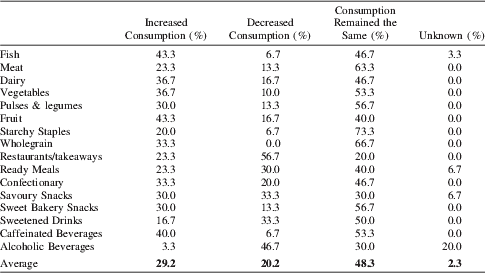Women are the gatekeepers in around 80% of UK households( Reference Webb 1 ). Therefore, the food choices that women make will not only have an impact on their own health, but also that of their partners and children. The majority of women go through the transition into motherhood, which is associated with social, psychological, behavioural and biological change. Some food choice adjustments may therefore be made to accommodate these changes, forming part of a nutritional trajectory that develops over the lifecourse.
This study used a retrospective questionnaire to investigate the effect of motherhood on a variety of food choices over a post-partum period of up to 13years. The study also considered a number of mediating demographic and socioeconomic variables which may have also influenced food choice. Respondents also completed an estimated 3-day food diary. This project was approved by the University of Leeds Faculty of Mathematics and Physical Science Ethics Committee (reference MEEC-11-010).
Thirty-one mothers (average age 30 years, range 18–45, living in Leeds) with between 1 and 2 children completed the questionnaire and estimated food record. Fifty percent of women reported having changed their food consumption across 16 food categories. The positive changes included a decrease in the consumption of take-away foods and alcoholic beverages, and increases in fish, fruit, vegetable and dairy. Negative changes included an increase in the consumption of caffeinated beverages. The least change was reported in relation to staple starchy food and meat consumption. Older mothers reported the highest number of beneficial changes compared to younger mothers. The food diaries revealed that mothers had adequate intakes of macronutrients and most micronutrients, with the exception of vitamin A (average intake at 80% of RNI), folic acid (average intake at 60% of RNI) and iron (average intake at 80% of the RNI). Intakes were mostly above the LRNI.

Perceived changes in dietary habits by mothers across 16 food categories.
In conclusion, motherhood affects food choices significantly. Interventions to improve the diets of this group of women can have impact on their long term health, and that of their dependents.


